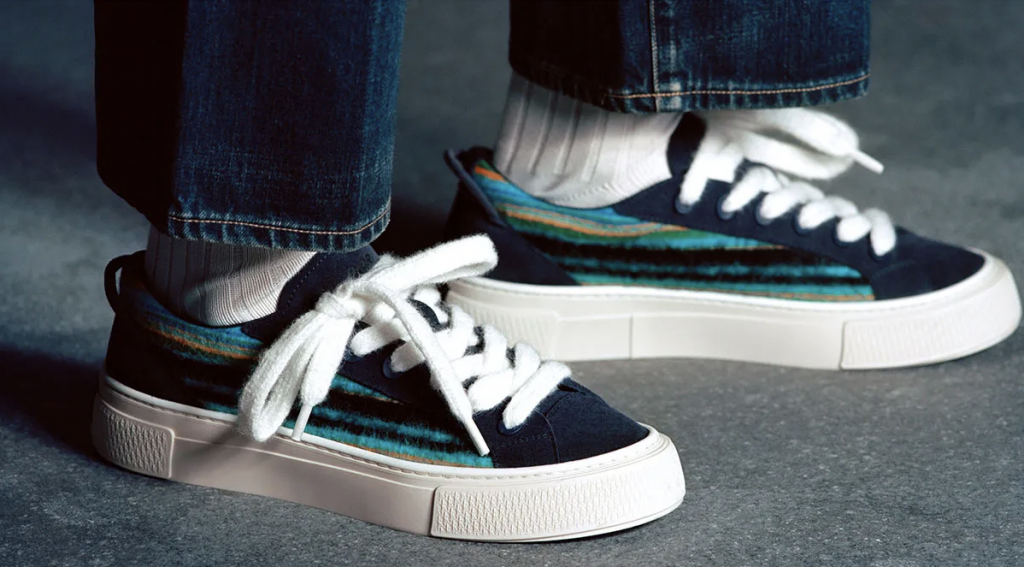You are what you wear. On your feet, that is — for sneaker enthusiasts.
The global sneaker industry was valued at around 72.2 billion in 2020 and is expected to reach 120 billion by 2026, according to insights source Circular Online.
But over the past few years, its collector culture has hit a plateau.
A cooling market and persistent counterfeits have contributed to prevailing sneakerhead fatigue, sparking speculation as to whether the sneaker bubble has burst. In response, players like Nike, Adidas, and Puma are pivoting to Web3 to fight back.
“The very essence of the concept of 'ownership' is morphing. It’s evolving,” Dale Parr, fashion innovation consultant and sneaker aficionado, tells Jing Daily.
Merging worlds#
Platforms like Nike’s Dot Swoosh, ALTS by Adidas, and Rtfkt have found success by bringing together Web3 denizens and sneaker enthusiasts — two cohorts that share a distinct overlap in values.
“Rtfkt showed us what’s possible when you lean into digital, when you rally a community around a shared vision. It was grassroots,” Parr says. “Now, post-Nike involvement, the gamification of different designs, color patterns, and traits is making these products more enticing than ever.”
The luxury industry is catching on. Famed for its haute-couture pieces, Balmain partnered with Space Runners to drop its first Web3 collection of sneakers specifically designed to target sneakerheads. Dior did the same in July this year.

Surviving the crypto winter’s NFT crash#
Unlike the majority of NFT projects, token-gated sneaker communities have remained largely unaffected by recent market crashes and the “crypto winter.” In fact, they’ve maintained a strong growth trajectory.
Sol3mates, a Web3 sneaker studio owned by UAE-based luxury retail corporation Chalhoub Group, launched its first sneaker activation during the height of the altcoin upheaval (altcoin refers to any alternative cryptocurrency to Bitcoin). But the timing actually worked in the company’s favor.
“The advantage of launching during a crypto winter is that you attract the people that really care, not only the people that are in it to make a quick buck,” Nick Vinckier, co-founder of Sol3mates, tells Jing Daily. “The vast majority of people are in it for the right reasons, which is creating positive disruption in the sneaker industry, empowering the designers, and creating innovative silhouettes.”
Sol3mates now boasts a fervent community of collectors that aren’t fazed by market fluctuations. Parr is one of them.
“[Sol3mates] prioritizes the artist, the creator. They ensure value is fairly distributed, all while being conscious about avoiding excess production volumes and the footprint we leave on this earth,” Parr says.

Small supply drives demand#
Vinckier believes that sneakerheads are so big on Web3-native communities because of their rarity factor, which is also a more sustainable alternative.
Platforms like Rtfkt and Sol3mates have significantly scaled back on supply compared to conventional collections, with Sol3mates’ first drop consisting of just 500 pieces. By keeping inventory in the hundreds, copping a pair is like collecting gold dust.
“Typical sneaker drops now are never really limited-edition,” Vinckier says. “Look at Nike Chicago’s. There’s more than 250,000 per year being dropped now; it’s not really a limited edition anymore.”
Extremely limited-supply drops are driving demand to new heights; Nike’s tie-up with digital sneaker studio Rtfkt is a shining example. In 2022, a pair of Rtfkt x Nike Dunk Genesis sneakers, created in collaboration with artist Takashi Murakami, sold for 134,000 due to their perceived scarcity.

Charles Hambro, founder of metaverse data platform GEEIQ, also questions if Web3-native sneakers signify more than just the product themselves. Hambro points to how enthusiasts are purchasing these sneakers as entry points into a brand’s tight-knit community.
“What we’re now seeing is a lot of phygital NFTs driving this value, with a lot of value connected to the physical goods themselves. The question is: Are people buying these connected NFTs to access the physical product, or are they buying them to become part of a community?” he said during Jing Daily’s “Is the metaverse enough? Exploring mixed reality, phygital and luxury in Web3” webinar in May.
Even during the height of the NFT market crash this year, Nike’s inaugural Dot Swoosh drop made over 1 million in digital sneaker sales. The platform received so much traffic that it crashed, sparking frustration among sneaker fans.
Hambro also notes that Nike is now able to sell a single pair of phygital sneakers for an average of 1,135 through its collaboration with Rtfkt. Each token acts as a key into the Rtfkt membership.
Combating counterfeits#
The proliferation of counterfeit sneakers has led to over 16 percent of sneakers sold online today being fake, according to Internet Retailing.
This year, for example, StockX found itself embroiled in a counterfeit controversy with Nike, who accused StockX of selling lookalike versions of its designs via its site.
The blockchain is displaying impressive potential in combating the black market, propelling brands to lean further into the decentralized landscape.
Sol3mates’ shoes arrive with an NFC-enabled chip that assures authenticity as well as links the physical product to its unique digital counterpart.
Likewise, Puma embedded its own NFC chips into its GS-XL sneakers to boost authenticity and value as part of its Evolution of the Mixtape collection in July. When scanned, the chip also unlocks access to exclusive mixtapes and other digital content.
The tech protects consumers from purchasing counterfeit goods and also strengthens trust between buyers and brands, ultimately undermining the counterfeit market's profitability.
Community co-creation#
One notable trend that has taken off in Web3 is co-creation. Nike, Puma, Adidas, Rtfkt, and Sol3mates have all introduced systems that engage their cohorts in the sneaker design process — something that Vinckier believes creates a more inclusive and dynamic community.
“It’s literally a market researcher's dream, having 10,000 customers tell you exactly what they want from you,” he says. “It’s so much better than standing in a lab trying to guess what your audience wants.”
Through crowd-sourcing, brands can gather input, feedback, and creative concepts directly from the collector, ultimately driving engagement and sales.

“Among the various applications [in Web3], the most interesting ones have the ability to confer real uniqueness to individual objects and disrupt the counterfeit market, but also elevate the sense of community and the role of individuals in this subculture,” Rocco Bressanin, founder of Web3 design studio OnlyEver, tells Jing Daily.
OnlyEver was launched from within the Italian footwear company Rubensluciano. “Beyond the fundamental aspect of collecting, we have had the opportunity to experiment at OnlyEver, where the most significant innovation lies in the creation phase,” Bressanin adds.
Platforms like OnlyEver are exploring the footwear opportunity beyond the sneaker market. But streetwear remains in pole position.
“It's normal that in the Web3 space, where community is central to everything, the first category to be explored by brands is the one with a strong and structured existing community, like sneakerheads,” Bressanin says.
Reinventing the concept of ownership#
The integration of Web3 technology in the world of sneakers is transforming how sneakerheads connect, collect, own, and collaborate.
Today, brands are putting their best foot forward to stay ahead of the sneaker curve and unite the NFT and streetwear “hypebeast” markets. And Parr believes this is only just the beginning.
“There's still hesitation and caution in the luxury circles. But sportswear and streetwear, backed by the youthful energy of a generation ready to embrace what’s next, they see it. They understand the multi-layered, multi-dimensional future of what it means to truly 'own' something,” he says.



